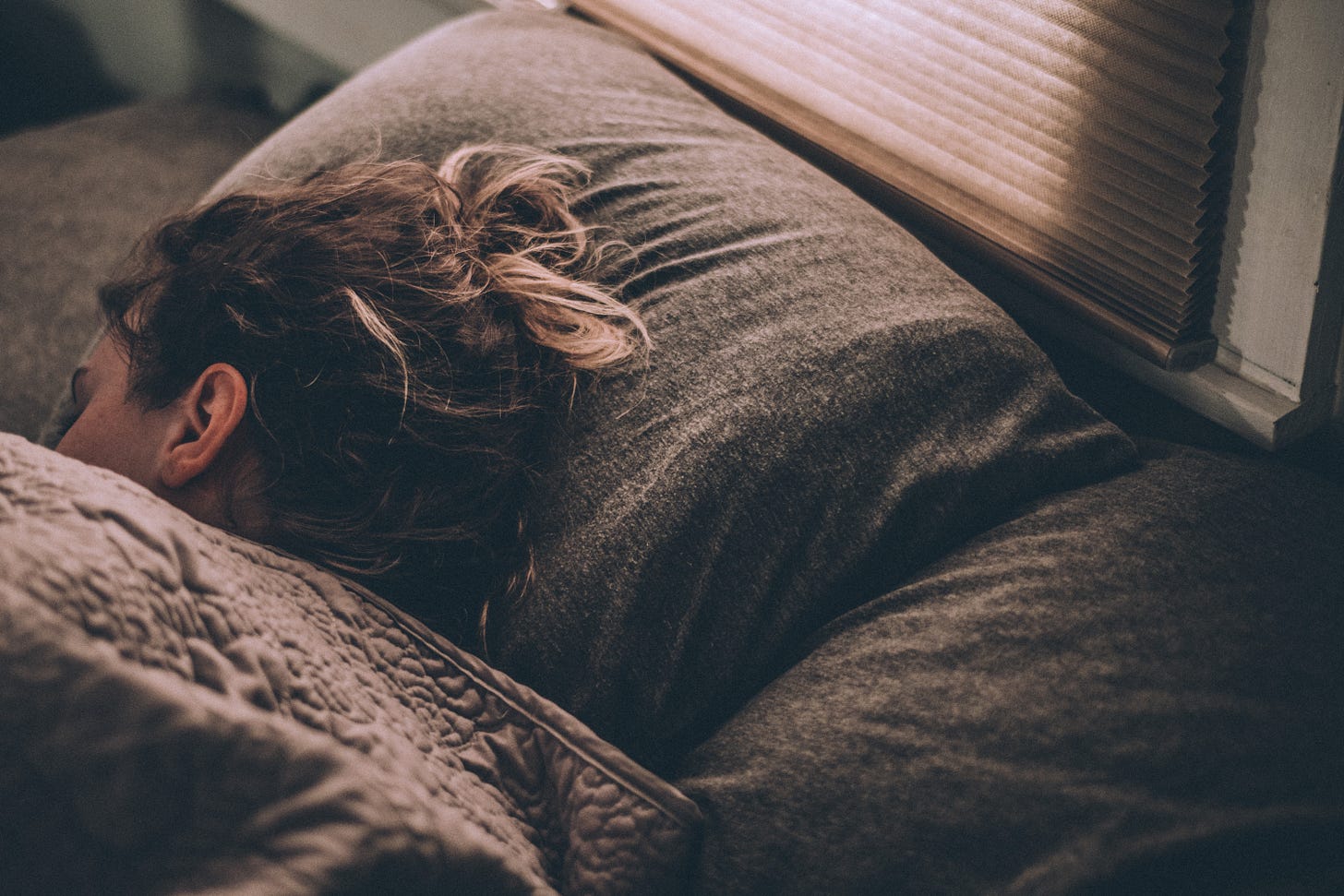The 7th of November was the third anniversary of my accident when a speeding motorcyclist hit me whilst out jogging. Only three years ago, I was lying in the neurosurgery ward at King’s College Hospital, in a state of morphine-induced torpor, waiting for a rehabilitation bed that didn’t materialise. Thankfully, I have made a reasonable recovery, with minor residual problems that have clipped my quality of life by ~20 percentage points. The latter is nothing compared to the counter-narrative of not being here to reflect on the experience. I am genuinely grateful for being alive. Many people continue to ask me about the accident, which is receding from my memory.

My post-traumatic flashbacks, typically triggered by the sound of a speeding motorbike, are now quite rare. However, the one thing that still haunts me is the chronic insomnia I experienced due to the pain and discomfort of not being able to roll over in bed. For about six months, I had to sleep on my back. I was unable to roll over due to the fact I had a fractured pelvis and was wearing a neck brace. As a result of lying on my back, I developed a heat rash that was torture. The rash was itchy, and I developed a burning sensation that made me want to have a cold shower. In retrospect, I suspect the latter was a side effect of the high doses of morphine I was taking to control the pain. Not only did I have pain from my fractured cervical vertebrae and pelvis, but I also had radicular or neuralgic pain radiating down from my neck to my hand. The radicular or neuralgic pain has to be the worst pain I have ever experienced and much worse than the pain I experienced when I had renal colic.
Because of my ordeal, I now appreciate what my patients go through when they have neuralgia or complain about insomnia. When I see patients with Parkinson’s disease, I always ask them whether or not they can roll over in bed at night. This is an indication of whether or not their motor symptoms are being adequately managed at night. Since having my accident, I now ask my patients with advanced MS the same question. Once you have experienced the torture of being immobile in bed yourself, you realise how important it is for people with neurological or other conditions as well. This is a personal example of how ‘the lived experience’ impacts medical practice.
If you have problems rolling over in bed at night, there are things you can do to help yourself.
Stretching and range of motion exercises: doing gentle stretching and range of motion exercises during the day can help improve flexibility and reduce muscle stiffness, making it easier to roll over in bed at night.
Physical therapy: please see a physio or physical therapist who can provide a personalised exercise programme and teach you techniques to address specific mobility issues and improve overall movement.
Medication: ensure you have been assessed and prescribed appropriate medications to manage muscle spasticity and spasms, and pain during the night.
Use of supportive devices: utilising supportive devices such as bed rails, grab bars, monkey ropes, or specially designed pillows can provide additional assistance and stability when transitioning in bed.
Low-friction bed linen and pyjamas: using satin or low-friction linen and pyjamas can make the difference in being able to roll over in bed or not.
Specialised beds: if all else fails, you may need to purchase a tilting bed that helps automate the process of rolling over in bed. These beds are expensive and, in general, are not covered by NHS budgets.
Maintaining a comfortable sleep environment: creating a comfortable and supportive sleep environment, including using a supportive mattress and pillows, can help reduce discomfort and make it easier to roll over at night.
I have previously commented on a short commentary in the BMJ on ‘How to write your own wellbeing prescription’. The top piece of advice was to improve your sleep. Sleep is probably the most essential performance-enhancing agent we know. We know poor sleep is the elephant in the room. Most studies on sleep in MS show that over 70% of pwMS have a sleep disorder—the following results from a survey we did many years ago of our MS-Blog readers illustrates the problem. Only 12% of respondents reported having no problems with sleep. I doubt much has changed.
You know what it is like if you wake in the morning and have had a good night’s sleep; you feel energised, your mood is better, and you are prepared to take on the world. In contrast, when you wake from a night of tossing and turning, or not being able to turn, legs jerking, getting up to go to the toilet several times, with a hangover from too much alcohol the night before, etc., you find it challenging to get through the day; you are irritable, and your mood is low.
The study below shows that restless legs syndrome, common in pwMS, affects sleep quality and is associated with poor cognition in people with MS. So, if you have RLS, bring it to the attention of your HCP so that you can get it treated.
The following is a simple self-help guide to improve your sleep hygiene:
Ensure you spend an appropriate amount of time asleep in bed, at least 6 hours. Some people need more than this to feel refreshed.
Limit daytime naps to 30 minutes. Please note that napping does not make up for inadequate nighttime sleep.
Avoid stimulants such as caffeine, modafinil and nicotine close to bedtime.
Only drink alcohol in moderation. Alcohol is well-known to help you fall asleep faster, but too much disrupts sleep.
Exercise helps improve sleep quality. As little as 10 minutes of aerobic exercise daily can improve sleep quality.
Don’t eat before going to bed. Heavy foods and fizzy drinks can trigger indigestion or heartburn/reflux that disrupts sleep.
Ensure you get adequate exposure to natural light; exposure to sunlight during the day and darkness at night helps maintain a regular sleep-wake cycle.
Establish a regular relaxing bedtime routine, which helps the body recognise it is bedtime. This could include taking a shower or bath or reading. However, avoid reading or watching emotionally upsetting content before attempting to sleep.
Make sure that your sleep environment is pleasant. Your mattress and pillows should be comfortable. The bedroom should be cool for optimal sleep (16-20°C). The bright light from lamps, smartphones and television screens can make it difficult to fall asleep, so turn those lights off or adjust them when possible. Use the blue filter mode on your smartphone and other devices that reduce the inhibition of melatonin from light. Consider using blackout curtains, eyeshades, earplugs, white noise machines and other devices to make the bedroom more relaxing.
And if you have pain, nocturia, restless legs, sleep apnoea, etc., get these adequately managed via your HCP.
Please let me know what strategies work for you to improve your sleep. An essential role of MS-Selfie is to share best practices and alternative practices. I like it when pwMS hack their physiology to develop solutions that work. Don’t forget the current treatment strategy is to maximise your brain health, and part of this philosophy is the holistic management of MS, including sleep.
You may find the following MS-Selfie Newsletters helpful:
Research paper
Background: Restless Legs Syndrome (RLS) is a prominent sleep disorder that often worsens sleep quality and perhaps cognitive function in adults with multiple sclerosis (MS). The present study examined the relationships among RLS prevalence and severity, sleep quality, and perceived cognitive impairment in adults with MS.
Methods: Participants (N=275) completed the Cambridge-Hopkins Restless Legs Syndrome Questionnaire, the International Restless Legs Syndrome Study Group (IRLS) Scale, the Multiple Sclerosis Neuropsychological Screening Questionnaire (MSNQ), the Pittsburgh Sleep Quality Index (PSQI), the Patient Determined Disease Steps (PDDS), and a demographic and clinical characteristics questionnaire.
Results: Persons with MS who had RLS (i.e., MS+RLS; n=74) reported significantly worse perceived cognitive impairment compared with those who did not have RLS (n=201; p=0.015). Bivariate correlation analyses within the MS+RLS group indicated that greater RLS severity was significantly associated with more severe perceived cognitive impairment (r=0.274) and sleep quality (r=0.380), and worse perceived cognitive impairment was significantly associated with worse sleep quality (r=0.438). Linear, step-wise regression analyses indicated that RLS severity significantly predicted perceived cognitive impairment (β=0.274), but the inclusion of sleep quality (β=0.391) accounted for the relationship between RLS severity and perceived cognitive impairment (β=0.126).
Conclusions: Our results suggest that sleep impairment may be an intermediary factor in the association between RLS severity and cognitive impairment in persons with MS who present with RLS. The diagnosis and treatment of RLS symptoms and other effectors of sleep quality could improve neuropsychological consequences of MS.
Subscriptions and donations
MS-Selfie newsletters and access to the MS-Selfie microsite are free. In comparison, weekly off-topic Q&A sessions are restricted to paying subscribers. Subscriptions are being used to run and maintain the MS Selfie microsite, as I don’t have time to do it myself. You must be a paying subscriber if people want to ask questions unrelated to the Newsletters or Podcasts. If you can’t afford to become a paying subscriber, please email a request for a complimentary subscription (ms-selfie@giovannoni.net).
Important Links
X (Twitter) / LinkedIn / Medium
General Disclaimer
Please note that the opinions expressed here are those of Professor Giovannoni and do not necessarily reflect the positions of Queen Mary University of London or Barts Health NHS Trust. The advice is intended as general and should not be interpreted as personal clinical advice. If you have problems, please tell your healthcare professional, who will be able to help you.














Share this post